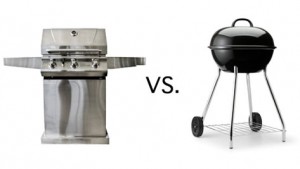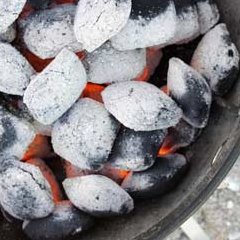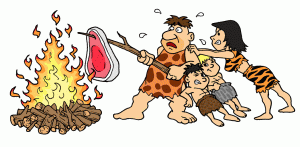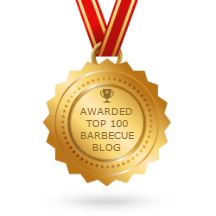What Fires You Up? Grilling vs. Barbecue and Gas vs. Charcoal
Here is another great article from my friend Arnie Tomaino of GrillJunkie.com He provides his personal insight to some common misconceptions.
What Fires You Up?
There are two inevitable if not obligatory questions that arise for anyone even remotely interested in outdoor grilling. What is the difference between Grilling and Barbecue? And what heat source produces the best tasting grilled foods, Charcoal or Gas?
 Let's tackle the first question, “What is the difference between Grilling and Barbecue?” In essence, what we are attempting to explain here is the core differences between grilling and barbeque techniques, or, as many refer to as the direct versus indirect method, while attempting to avoid taking a side amongst the purists of the two camps. At GrillJunkie we encourage the practice and experimentation of both methods, …..again fortifying our motto, “Whatever Fires You Up!” People often use the term barbecue when referring to foods that are grilled, but barbecuing and grilling are two very different processes.
Let's tackle the first question, “What is the difference between Grilling and Barbecue?” In essence, what we are attempting to explain here is the core differences between grilling and barbeque techniques, or, as many refer to as the direct versus indirect method, while attempting to avoid taking a side amongst the purists of the two camps. At GrillJunkie we encourage the practice and experimentation of both methods, …..again fortifying our motto, “Whatever Fires You Up!” People often use the term barbecue when referring to foods that are grilled, but barbecuing and grilling are two very different processes.
Barbecuing
Barbecuing refers to foods that are cooked with a long, slow process using indirect, low-heat generated by smoldering logs, wood chips that smoke-cook the food. The fuel and heat source are separated from the cooking chamber, but the cooking chamber contains enough heat to slowly but properly cook the food over a long period of time. Along with heat, the cooking chamber fills with smokes, providing the food with its characteristically smoky flavor, which varies depending on the type of wood that is used for the fuel. The best temperature for barbecuing is between 200°F and 300°F. If the temperature rises above 300°F, it is considered grilling.
Grilling
Grilling refers to foods that are cooked more quickly and directly over high heat. The fuel and heat source are not separated from the cooking chamber thus providing for an environment that provides for high heat.
Grilling temperatures typically reach 500°F or more, but any temperature above 300°F is considered a grilling temperature. The high heat of grilling sears the surface of meat, creating a flavorful browned crust.
Now onto the next question, “Which produces better tasting food? Charcoal or Gas?”
This question is similar to the Grilling versus Barbecue issue. This one however, albeit an age old question like that of direct versus direct cooking, may not have quite as clear or definitive of an answer. Excuse the pun, but it really is a matter of “taste” and/personal preference. There is, however, a bit of evidence that will help shed some light point you in the right direction.
 Although debatable, charcoal purists will claim that the use of the beloved briquette produces better tasting grilled foods most of the time. This is not to say that some things taste any worse, it is just that some claim that things don't taste any different. Or at least some foods, that is. We recently did a blind taste test and uncovered that most folks could not tell the difference between hamburgers or skinless chicken breasts cooked over gas or charcoal. However, it was found that people could tell the difference with a steak. Our conclusion was that the longer you grill something the more the flavor of the fire gets into the food. The mechanism involved here is the smoke. Charcoal, even though it is just smoldering, produces smoke.
Although debatable, charcoal purists will claim that the use of the beloved briquette produces better tasting grilled foods most of the time. This is not to say that some things taste any worse, it is just that some claim that things don't taste any different. Or at least some foods, that is. We recently did a blind taste test and uncovered that most folks could not tell the difference between hamburgers or skinless chicken breasts cooked over gas or charcoal. However, it was found that people could tell the difference with a steak. Our conclusion was that the longer you grill something the more the flavor of the fire gets into the food. The mechanism involved here is the smoke. Charcoal, even though it is just smoldering, produces smoke.
Gas grills use a clean fuel that does not really produce smoke in and of itself. Although some manufacturers will claim that their patented vaporization barriers produce smoke from dripping grease, most folks don't want the taste of burning grease in their food. The kind of smoke that improves the flavor of food is the kind you get from real smoke, from an intended source.
To get that highly desired smoke flavor, you can add smoker chips in a box to produce smoke, however, in order to pass that flavor to the food you need to saturate it in smoke. Since charcoal produces some smoke and heat the two are mixed together. As the food absorbs the heat it also takes in the flavor of the smoke. So if you are a bit of purist and really like the flavor of foods, particularly things like a good steak, cooked over an open flame then you need to use charcoal.
However it is important to ensure that the smoke you are getting from the charcoal is “good” smoke. There is some weird and unnatural stuff out there so be careful. Commercial charcoals with special additives for easy lighting and cheap charcoal made from sawdust and a binding agent doesn’t exactly have the best flavor producing smoke. You want to use a good quality charcoal or mix your charcoal with chunks of good hardwood. Or you can buy lump charcoal that is actually make from real pieces of wood and not just sawdust. It is also very important to maintain a clean grill!. Build-up of ashes, burned up grease and other stuff will make the smoke produced leave a strange and undesirable flavor on foods. So in this light if you choose to use cheap self-lighting charcoal in a dirty, rusted grill then we’d suggest going with gas. If however you are serious about the flavor of grilled foods and are willing to put the effort into the art of charcoal cooking, then a good charcoal grill might just be what you need. Author Biography
Arnie Tomaino:Arnie is the Founder and President of GrillJunkie, and has been a grilling enthusiast for as long as he could hold a spatula. Arnie is responsible for the overall vision, strategic direction, and brand development of GrillJunkie. A self-proclaimed “weekend grill warrior”, Arnie combines his passion for outdoor cooking and writing, with his business experience in the Retail, Consumer Products, and High-Tech arenas where he has served in many positions including Corporate Communications, Brand Development, Product Marketing, and Strategic Development.
Arnie is the author of “The GrillJunkie – Burger-a-Day Cookbook.” He has held membership in the National Barbecue Association, and the New England Barbecue Society. Arnie holds a Bachelors Degree from Villanova University and a Masters of Business Administration in Marketing from Northeastern University. He and his wife live in Chelmsford, Massachusetts with their three daughters.

